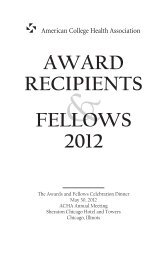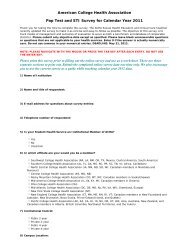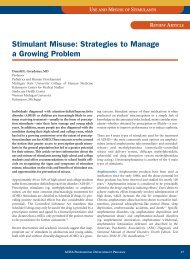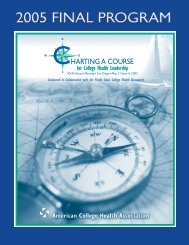Do your waiting areas, <strong>of</strong>fices, and exam rooms let studentsknow that you are willing to listen and talk about sexualviolence? It is suggested that you put up posters and distributeeducational materials that lets students know they are in a“safe” place.Screening for <strong>Sexual</strong> <strong>Violence</strong>Current research demonstrates that the majority <strong>of</strong> completedand attempted sexual assaults go unreported to lawenforcement. However, survivors <strong>of</strong> sexual violence <strong>of</strong>ten seekhealth/wellness services secondary to an incident but onlyreveal the experience to an individual if asked at the time <strong>of</strong>the visit. Therefore, college health pr<strong>of</strong>essionals have a significantopportunity to open the door to care for sexual assaultvictims and integrate primary prevention strategies to reducethe incidence <strong>of</strong> sexual violence.The following suggestions are primary prevention strategiesfor use within the college health setting:✤ Integration <strong>of</strong> screening questions for sexual violence intoall patient history forms✤ Use written assessment tools to measure vulnerability and riskbehaviors for sexual violence including alcohol/drug useOpportunities for <strong>Prevention</strong> Messagesduring Campus <strong>Health</strong> VisitsAll student visits should be inclusive <strong>of</strong> sexualviolence screening, but especially during:✤✤✤✤✤✤✤✤✤✤✤STI testingGynecology examsPregnancy testingEmergency contraception requestsBirth control requests<strong>Health</strong> education visitsMental health referrals/visitsAlcohol/other drug related visitsImmunizationsSports physicalsTriage✤ Use non-threatening, inclusive language and questions whenobtaining patient information✤ Develop patient teaching methodology that addressesvulnerability and risk reduction✤ Develop patient teaching methodology that includes healthyrelationships✤ Seek training to heighten awareness <strong>of</strong> options, rights, andreferral resources for campus victimsThe topic <strong>of</strong> sexual violence is a difficult one for discussion.The following are suggested questions that can be used onintake forms or asked in a direct and non-judgmental way:✤ Has someone ever touched you in a sexual manner againstyour will or without your consent?✤ Have you ever been forced or pressured to have sex?✤ Have you ever recognized you had “unwanted” sex whiledrunk or using drugs?✤ Within the past year, have you ever felt fearful <strong>of</strong> yourpartner because <strong>of</strong> verbal or physical threats?✤ Do you feel that you have control over your sexualrelationships and your partner will respect your wishesif you say no to specific sexual activities?✤ Is your visit today due to an experience you did not want tohappen?The suggestions provided can <strong>of</strong>fer a wealth <strong>of</strong> informationfrom students and allow college health pr<strong>of</strong>essionals to evaluate,educate, treat as appropriate, and refer for further services.SURVEY RESULTS . . .Does your student health service integratequestions regarding sexual violence into yourgeneral patient history or intake forms?36.5% Yes42.9% No20.6% UnsureACHA Spring 2007 Preventing <strong>Sexual</strong> <strong>Violence</strong> Survey12
Spread the Word aboutPreventing <strong>Sexual</strong> <strong>Violence</strong> (PSV)Is your campus encouraging an environment that supportsin every way the comprehensive and consistent message<strong>of</strong> prevention <strong>of</strong> sexual violence? If not, ask what needs tochange, and how you can elicit that change. If yes, howcan you spread the word to other campuses?<strong>College</strong> health pr<strong>of</strong>essionals have a very powerful andunique opportunity to educate students who come to their<strong>of</strong>fices about how to prevent sexual violence through primaryprevention. The goal <strong>of</strong> this toolkit is to reach as manystudents as possible about this important topic. However, notall students will come to your <strong>of</strong>fice during the school year.Therefore, the following are recommendations for spreadingthe word through different avenues on campus and in thecommunity.New Student Orientation✤ New students always receive welcome materials, information,and resources when they start their first year. Take theopportunity to include PSV information in their welcomepacks to make sure that every student knows the facts aboutsexual violence and where to receive additional informationand/or support on campus. Consider sending an email toall entering students about the resources on campus.Residence Hall Programs✤ Reach out to residence hall staff, including resident assistants,to ensure that they are educated and well-informedabout PSV and the specific resources on campus and inthe local community. Offer to be a guest speaker and/orresource for issues around sexual violence prevention.Sorority and Fraternity Housing✤ If your campus has a Greek system, meet the Interfraternityand Panhellenic Council leaders. They are the gatekeepersto all Greek students on campus. Offer the toolkit as aresource to be shared among leaders and Greek houses.✤ Sororities and fraternities typically schedule many events fortheir members during the academic year. Offer to presentor facilitate a program around primary prevention <strong>of</strong> sexualviolence. The “10 Ways Young Men Can Prevent <strong>Sexual</strong><strong>Violence</strong>” on page 14 is particularly relevant to fraternities.Enlist Greeks in peer education and/or invite individualhouses to play a significant part <strong>of</strong> primary prevention oncampus.Organizations, Clubs, and Teams on Campus✤ Reaching out to clubs, organizations, and teams on campusis a unique way to reach high-risk target groups <strong>of</strong> students.Providing information about PSV to athletic teams (includingcoaches and athletic trainers), Greeks, women’s centeror interest groups, religious groups, LGBT students, andcultural diversity groups will spread the word about theimportance <strong>of</strong> primary prevention. These opportunities arealso unique ways to recruit peer educators and leaders inbystander intervention programs.Academic Departments✤ Contact faculty who teach courses related to sexualityand relationships. They may teach courses in women’sstudies, psychology, sociology, health and wellness, medicine,social work, counseling, etc. This toolkit could beused in class projects, research, and for class discussions.Offer to guest lecture in classes when faculty need to cancelclass. Ask your institution’s faculty senate/union to sendan email to all faculty about the availability <strong>of</strong> the toolkitand presentations on SVP.Campus Radio Stations✤ If your campus has a radio and/or closed circuit TV station,an excellent way to share news about PSV on campus withstudents is through public service announcements (PSAs).Stations are required to air a certain number <strong>of</strong> PSAs eachweek. Create and send a PSA to your campus station andrequest that it be aired — it likely will be heard/seen manytimes over the course <strong>of</strong> a year. An interview with a <strong>Sexual</strong>Assault Response Team (SART) member or student advocatewould provide a strong message <strong>of</strong> prevention.Reaching Parents✤ Share prevention <strong>of</strong> sexual violence resources on campusand in this toolkit with parents. This communication caninclude emails, direct mail, or through Alumni <strong>of</strong>fices.Community Groups✤ Community groups are a well-known resource for youngpeople seeking information or services regarding sexualhealth and sexual violence. We suggest contacting yourcounty government <strong>of</strong>fices, health departments, communityclinics, local police departments, and other relevant groupsto let them know the resources on campus for students inneed. Share this toolkit with any partner community organization,coalition, or collaborative partner.13


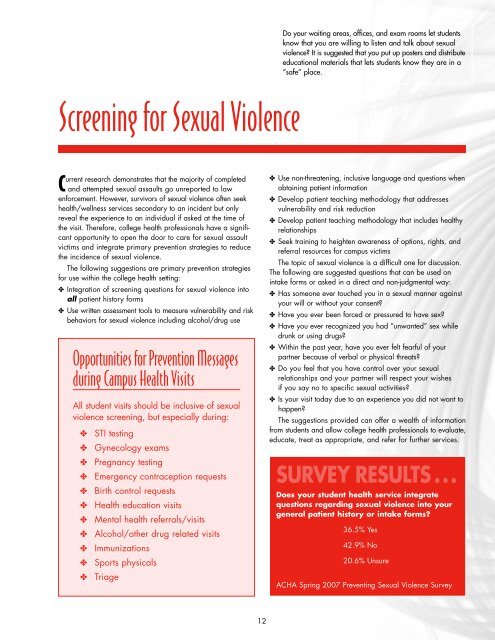
![Final Program [5.4MB pdf] - American College Health Association](https://img.yumpu.com/49022356/1/190x245/final-program-54mb-pdf-american-college-health-association.jpg?quality=85)



